Book contents
- Frontmatter
- General Introduction
- PART ONE INVENTING THE AMERICAN NOVEL
- PART TWO REALISM, PROTEST, ACCOMMODATION
- PART THREE MODERNISM AND BEYOND
- Introduction: modernism and beyond
- 37 Stein, Hemingway, and American modernisms
- 38 The Great Gatsby and the 1920s
- 39 Philosophy and the American novel
- 40 Steinbeck and the proletarian novel
- 41 The novel, mass culture, mass media
- 42 Wright, Hurston, and the direction of the African American novel
- 43 Ellison and Baldwin: aesthetics, activism, and the social order
- 44 Religion and the twentieth-century American novel
- 45 Faulkner and the Southern novel
- 46 Law and the American novel
- 47 Twentieth-century publishing and the rise of the paperback
- 48 The novel of crime, mystery, and suspense
- 49 US novels and US wars
- 50 Science fiction
- 51 Female genre fiction in the twentieth century
- 52 Children's novels
- 53 The American novel and the rise of the suburbs
- 54 The Jewish great American novel
- 55 The Beats and the 1960s
- 56 Literary feminisms
- 57 Reimagining genders and sexualities
- PART FOUR CONTEMPORARY FORMATIONS
- A selected bibliography
- Index
45 - Faulkner and the Southern novel
from PART THREE - MODERNISM AND BEYOND
Published online by Cambridge University Press: 28 July 2011
- Frontmatter
- General Introduction
- PART ONE INVENTING THE AMERICAN NOVEL
- PART TWO REALISM, PROTEST, ACCOMMODATION
- PART THREE MODERNISM AND BEYOND
- Introduction: modernism and beyond
- 37 Stein, Hemingway, and American modernisms
- 38 The Great Gatsby and the 1920s
- 39 Philosophy and the American novel
- 40 Steinbeck and the proletarian novel
- 41 The novel, mass culture, mass media
- 42 Wright, Hurston, and the direction of the African American novel
- 43 Ellison and Baldwin: aesthetics, activism, and the social order
- 44 Religion and the twentieth-century American novel
- 45 Faulkner and the Southern novel
- 46 Law and the American novel
- 47 Twentieth-century publishing and the rise of the paperback
- 48 The novel of crime, mystery, and suspense
- 49 US novels and US wars
- 50 Science fiction
- 51 Female genre fiction in the twentieth century
- 52 Children's novels
- 53 The American novel and the rise of the suburbs
- 54 The Jewish great American novel
- 55 The Beats and the 1960s
- 56 Literary feminisms
- 57 Reimagining genders and sexualities
- PART FOUR CONTEMPORARY FORMATIONS
- A selected bibliography
- Index
Summary
Penning his infamous critique of the state of art, letters, and literacy in the cultural desert he dubbed “The Sahara of the Bozart,” H. L. Mencken quotes a “true poet,” one J. Gordon Coogler, whom he calls “the last bard of Dixie”: “Alas for the South! Her Books have grown fewer. / She was never much given to literature.” According to Mencken, with the single exception of James Branch Cabell, “you will not find a single southern prose writer who can actually write.” Soon after Mencken wrote these words in 1917, the region he had defined as a desert would become home to an unparalleled concentration of the most gifted writers in the history of the United States.
The Southern Renaissance has been declared by critics as having begun in 1929, the year that saw the publication of major works by Robert Penn Warren, Thomas Wolfe, and William Faulkner. From the outset, poet and sometime novelist Allen Tate questioned the appropriateness of the word “renaissance,” concluding that this literary outpouring “was more precisely a birth, not a rebirth.” Building on Tate's insights, historian C. Vann Woodward concluded that “nothing comparable had happened before in the South that could conceivably be said to have been reborn in the twentieth century.” Introducing “[t]he second and more common historical usage of [the term] ‘renaissance’ “ to refer to “the evocation of the ghost of a dead civilization, as the ghost of Hellenic culture was evoked in thirteenth to fifteenth-century Italy,” Woodward insisted that “surely nothing of that sort took place in the South.”
- Type
- Chapter
- Information
- The Cambridge History of the American Novel , pp. 750 - 766Publisher: Cambridge University PressPrint publication year: 2011



